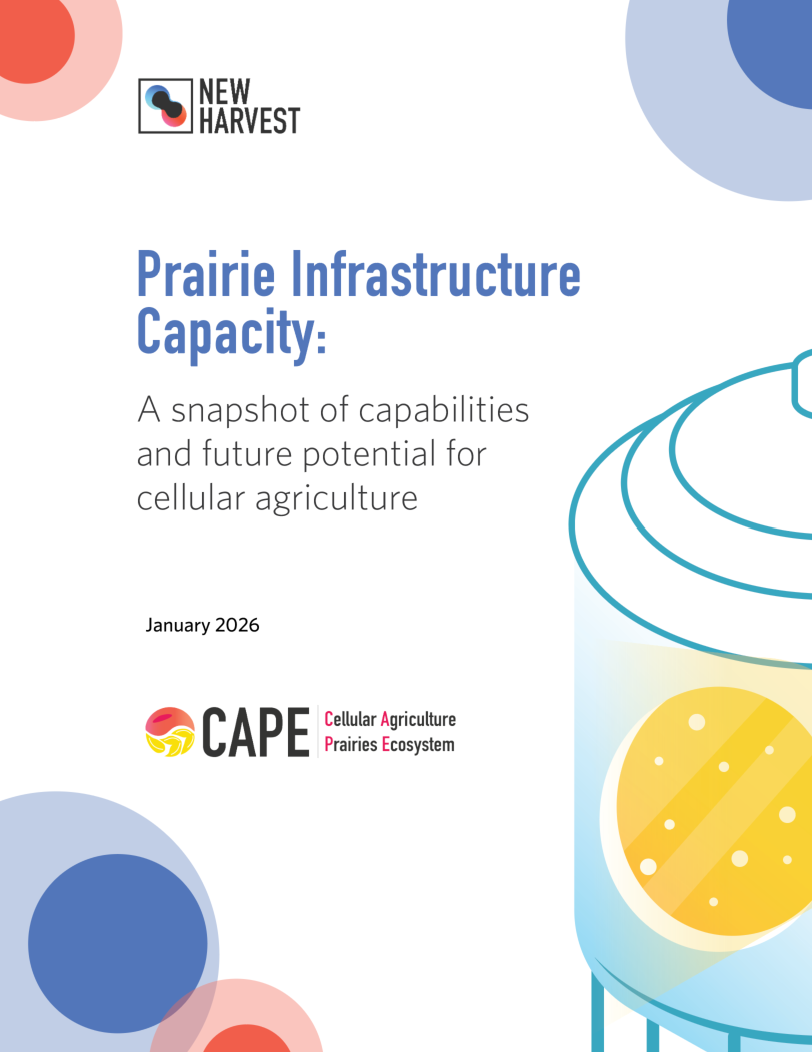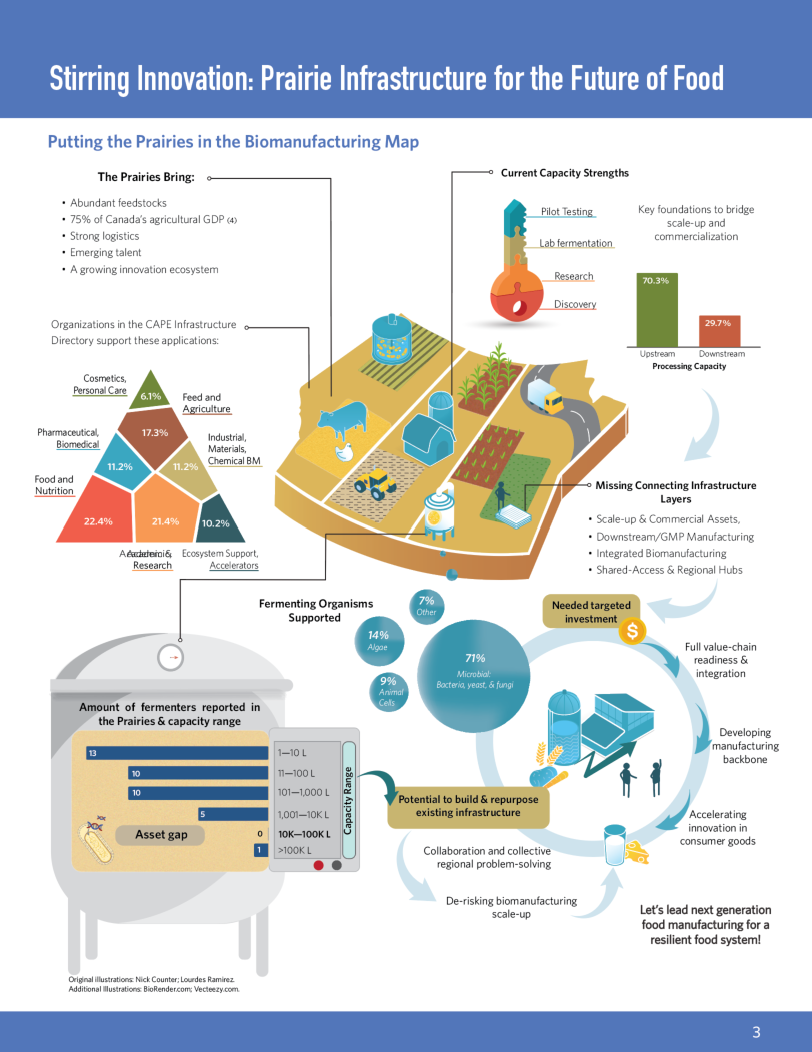A 12-partner effort to kickstart a cellular agriculture applied research and innovation ecosystem on the Canadian Prairies.
2025 - Ongoing
As an emerging industry, cellular agriculture has yet to be adequately connected to regional agricultural supply chains that could provide the necessary ingredients for growing different types of cells.
This project, supported by PrairiesCan and Alberta Innovates*, aims to build a cellular agriculture research and innovation ecosystem in the Prairies by prototyping local agricultural resources as biomanufacturing inputs while building out local talent and research infrastructure. It leverages existing local competitive advantages: agricultural, manufacturing, and research excellence, plus New Harvest’s field-building expertise to drive economic development and global competitiveness.
*Government funding covers only half of the cost of this project. Contributions from supporters like you are critical to bridging the remaining 50% and turning this work into real-world impact.
Cellular Agriculture Prairies Ecosystem (CAPE)
Overview
CAPE is a three-year project focused on coordinated biomanufacturing/cellular agriculture (BM/CA) ecosystem-building activities centred in the Prairies to connect BM/CA innovators with local agricultural resources and expertise.
The CAD$2.4 million project is led by New Harvest in collaboration with 12 partners from industry and academia that will form the CAPE consortium.
If successful, CAPE could be the first of many steps toward agricultural circularity, reducing food production emissions, and adopting local crops and supply chains to decrease reliance on unsustainable imported goods, while building a resilient, locally driven food system.
Objective 1
Building BM/CA research and innovation capacity by mapping and activating infrastructure for talent and technology development
2025 - Ongoing
Objective 2
Building research-driven platforms to connect BM/CA technology development to local agricultural supply chains
2025 - Ongoing
Objective 3
Strengthening the local BM/CA ecosystem through network building and knowledge mobilization to facilitate global awareness and collaboration
2025 - Ongoing
Cellular Agriculture Prairies Ecosystem (CAPE)
Impact
Prairie Infrastructure Capacity:
A snapshot of capabilities and future potential for cellular agriculture
Click for report data and references
Take a look at CAPE’s gap analysis highlights and explore the Infrastructure Directory
Our highlights
Read our press release announcing Alberta Innovates investment in CAPE here.
Four postdoctoral researchers and four PhDs have been recruited as part of the DERISC Fellowship.
Read PrairiesCan press release announcing CAD$1M investment in CAPE. Our press release can also be found here.
Check out our 2025 report “From Breadbasket to Bioeconomy” Converting Circular Agricultural Co-products into Agri-Food Biomanufacturing Opportunities in the Canadian Prairies
ONGOING RESEARCH PROJECTS
DERISC Fellowship
Defining, Enhancing, and Refining Agricultural Inputs and the Supply Chains of Cellular Agriculture and Biomanufacturing of Food Fellowship.
In collaboration with the University of Alberta, the University of Manitoba, Dalhousie University, and Lethbridge Polytechnic, we will fund five PhDs and four postdoctoral researchers who will bridge the gap between the agricultural sector and cellular agriculture or food biomanufacturing SMEs. They will explore how to valorize agricultural byproducts to obtain inputs for different food biomanufacturing processes.
2025- Ongoing
Learn about our fellow’s research projects:
-
Project Title: Developing a plant-based serum alternative from canola for use in cellular agriculture
Animal serum is vital for cell culture but is costly and ethically problematic. We propose using Canada's abundant canola meal, a high-protein byproduct, to create a sustainable alternative. Our project will identify growth-promoting peptides from canola protein to develop a plant-based serum replacement.
-
Project Tittle: Investigate the use of canola and pea sidestreams to produce affordable plant-based alternatives to fetal bovine serum (FBS)
This project aims to develop a sustainable, plant-based alternative to FBS by producing canola hydrolysates directly from canola meal under optimized process conditions. The study evaluates the effects of these hydrolysates on cell growth, morphology, and expression of growth-related markers in myocytes and adipocytes. It further assesses the long-term viability and proliferation of cells cultured in canola-supplemented media compared to conventional media. Additionally, the project identifies bioactive peptides within the canola hydrolysate and investigates their mechanisms in promoting cell growth and differentiation.
-
Project Title: Scalable Local Cell Line Establishment for Cultivated Beef Production
The limitation of expansion ability and the nature of adherent growth hinge the scaling-up of cultivated beef production. This project will focus on the immortalization and suspension adaptation of bovine satellite cells and fibroblasts isolated from Alberta cattle. The output of this project will not only provide a stable cell line for cultivated beef production, but also standard guidelines for engineering cell lines establishment through gene editing, spontaneous generation, and co-culture techniques.
-
Project Title: Analysis of sugar beet mash as a sustainable and cost-effective input for cellular agriculture and biomanufacturing processes.
This project turns sugar beet mash, a co-product from sugar processing, into a low-cost and eco-friendly source of glucose and other nutrients. These molecules will be used to feed microorganisms programmed to make food ingredients, medicines, and more.
-
Project Title: Obtention of canola bioactive peptides as sustainable natural growth promoters for cellular agriculture
Develop and evaluate an efficient and sustainable process for canola peptides obtained from hydrolysis with potential application as plant-based supplements for cellular agriculture.
-
Project Tittle: Utilizing Oilseed Co-products for Value-added Applications: Hemp meal as a source for production of cellular agriculture inputs
This project explores sustainable protein extraction from hemp meal, an oilseed byproduct, using reverse micelle extraction (RME) as a greener alternative to conventional methods. The resulting hemp protein hydrolysates, rich in amino acids and bioactive compounds, are intended to serve as cost-effective, animal-free supplements for serum-free cell culture media in cellular agriculture. The study aims to reduce agricultural waste and support scalable, ethical food production systems.
-
Project Title: Multi-omic Characterization and Functional Assessment of Agricultural Sidestreams.
Use of multi-omics techniques to comprehensively assess the composition of products derived from canola meal and sugar beet sidestreams to assess their suitability in cellular agriculture applications. Compositional data, including small molecules, metals and peptides, will be evaluated for their nutritional and anti-nutritional properties. Furthermore, this project will evaluate batch variability, accounting for impacts of seasonality, geographical location, and processing method.
-
Project Title: Lifecycle assessment (LCA) and Techno-Economy assessment (TEA)
Conducting TEA to evaluate the costs and benefits of integrating extracts from agricultural sidestreams, specifically canola meal (CM) and beet juice (BJ) into cellular agriculture
(CA) processes; as well as LCA that will compare the environmental impacts of this approach against current media ingredients and traditionally grown/farmed products, focusing on water usage, greenhouse gas emissions, and energy consumption. This research aims to identify a sustainable and cost-effective alternative to commercial culture media, facilitating the adoption of CA.
DERISC Fellowship
🧫
CAPE PROJECT
🧪
DERISC Fellowship 🧫 CAPE PROJECT 🧪
ONGOING RESEARCH PROJECTS
Infrastructure Directory
New Harvest Canada led a Gap Analysis Working Group to identify the available existing infrastructure, resources, and support available to companies seeking to establish or scale operations in Western Canada.
Findings from the survey and stakeholder consultations are published in our report, alongside an open-access directory designed to help SMEs, researchers, and other ecosystem partners identify assets, capabilities, and collaboration opportunities across the Prairies.
2025- Ongoing
This directory is a living resource and will be updated on an ongoing basis.
We would love to hear your feedback on the Directory and our findings, and welcome collaboration ideas, please don’t hesitate to get in touch.
Cellular Agriculture Prairies Ecosystem (CAPE)
Progress Timeline
2025
-
🚩 New Harvest launches the Cellular Agriculture Prairies Ecosystem (CAPE) project, and hires Miranda Stahn as our new Program Manager for Western Canada
-
◽Completed interview process for DERISC Fellows
-
◽Prairies Economic Development (PrairiesCan) announces a CAD$1M investment in CAPE
🚩CAPE Advisory Board is formed and meets for the first time
-
-
◽SPRING 2025 Cohort onboarding & kickoff of the DERISC Fellowship with the first six fellows
-
◽New Harvest announces a CAD$500,000 investment from Alberta Innovates in CAPE
◽PD Session # 1 “Product Safety” - Fellows receive a customized safety workshop from Vireo Advisors, a CAPE partner
-
◽Online Fellow's Meetup #1- Fellow participate in their first online meetup session to present and share their work so far!
-
◽PD Session # 2 “Sci Comm” - Fellows attended a PD session with Valerie Miller and Kaitlin Pylpa on presenting to diverse audiences
-
◽CAC West, CAPE AGM
◽FALL 2025 Fellowship Retreat
🚩From Breadbasket to Bioeconomy Report Launch! - Report highlighting the opportunity to use Prairie crop side streams for value added cell ag ingredients
◽Lourdes Ramirez joins our team as our new Program Coordinator for CAPE
-
◽1st Working Group Meeting- CAPE Working Group session collaborating to complete a gap analysis on Prairies biomanufacturing infrastructure
-
◽Gap Analysis (Ongoing)
-
🚩Infrastructure and expert gap analysis finalized
Plan for following years
-
◽CAPE collaboration agreements established and supported by all partners
◽Launching an online portal for resource-sharing
-
◽Development of prototypes from 1-2 crop-based novel inputs
◽Cell ag course development
-
◽Sharing Life Cycle Assesments (LCAs) and Techno-Economic Analyses (TEAs)
◽Sharing risk management and safety strategies
◽Testing promising prototypes from one or two crop-based novel inputs
Cellular Agriculture Prairies Ecosystem (CAPE)
Collaborators
Academic Partners
Industry Partners
Cellular Agriculture Prairies Ecosystem (CAPE)
Funders
CAPE is pubic-private partnership supported by diverse funders: Prairies Economic Development (PrairiesCan), Alberta Innovates, Mitacs, and New Harvest’s philanthropic donors.
Contact
If you have questions or would like to get in touch regarding CAPE, please contact Miranda Stahn at miranda@new-harvest.org
or complete The Cellular Agriculture Prairie Ecosystem (CAPE) Engagement Form!










